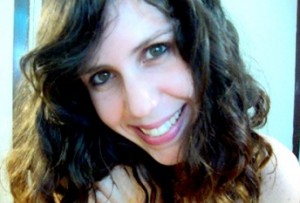 Marina Burana is an Argentinean writer born and raised in a city facing the sea. She has published two books of short stories in Spanish (”A Merlina”, 2007 and ”De escritores y miserias”, 2008) and has collaborated in magazines from Taiwan, Spain, Venezuela, Cuba, Chile and Argentina writing essays, articles and fiction. Some of her poems in Spanish have been published in anthologies from Spain and Argentina. It wasn’t until recently that she became drawn to theater and started writing some plays in English: Sfumato (2011), which had a staged reading in 2012 at The Last Frontier Theatre Conference in Alaska and at the IATI Theater in New York in 2013; and Heads and Tails (2012), which was invited to participate in The Playwrights’ Playground, at the Classical Theater of Harlem in New York in 2013. Marina plays the violin, is fluent in French, Chinese, reads Ancient Greek and loves painting and drawing. She currently lives in Asia. You can visit her here: www.marina-burana.com.
Marina Burana is an Argentinean writer born and raised in a city facing the sea. She has published two books of short stories in Spanish (”A Merlina”, 2007 and ”De escritores y miserias”, 2008) and has collaborated in magazines from Taiwan, Spain, Venezuela, Cuba, Chile and Argentina writing essays, articles and fiction. Some of her poems in Spanish have been published in anthologies from Spain and Argentina. It wasn’t until recently that she became drawn to theater and started writing some plays in English: Sfumato (2011), which had a staged reading in 2012 at The Last Frontier Theatre Conference in Alaska and at the IATI Theater in New York in 2013; and Heads and Tails (2012), which was invited to participate in The Playwrights’ Playground, at the Classical Theater of Harlem in New York in 2013. Marina plays the violin, is fluent in French, Chinese, reads Ancient Greek and loves painting and drawing. She currently lives in Asia. You can visit her here: www.marina-burana.com.
Soccer Sunday
My grandmother was not what you would call a good grandmother. Most people have fascinating grandmothers, or at least, in general, when we mention grandmas, the image of a sweet, tender, loving woman comes to mind. I guess I’m not one of those people who enjoyed long nights sharing family secrets or hot chocolate in winter, breaking parents’ rules and being excited about new kind of laws; those laws that you can find (I can only imagine) in a different world set up by a wonderful woman.
I don’t know what it is about grandmothers that usually makes them great, ’cause if you think about it, they were mothers themselves before being grandmothers, so how did they go from being annoying and protective to giving you candy when they knew they were not supposed to?
Anyway, that’s not my grandmother. My grandmother was a soccer fan who, even at the age of 90, stood you up in order to go and see her favorite team playing somewhere. So you’d wait for her outside her house but she’d never answer the door, and you’d go crazy through a list of possible fatalities such as dementia, heart attack, sudden death, and things like that. Many times I expected a call from my mother telling me that grandma was in the hospital and that I should rush over there to see how she was and find out what had happened to her. This fear (yes, you can call me ”alarmist”) was very strong when I was little and it slowly started fading away as I became older and got used to her ways. But I must say, it was never completely gone.
Eliza, that was her name, loved touching everything she saw (perhaps that was her way of getting to know things around her, go figure), hated cooking, complained almost about everything, couldn’t stand the word ”obviously” and never listened when others were talking. But most of the time she was really quiet. You could never really tell what was going on in her head. We only knew one thing, and one thing for sure: soccer, to her, was the most important thing in the world and when my mother (her daughter) invited her to have lunch with us on Sundays, she would simply say no and her eyes would glow like the eyes of an addict just about to get her favorite drug. Sundays were ”Soccer Sundays”, as she said. And that was that.
Eliza had another strange quality. She could see the future.
Her father, a strong and stubborn Spanish man from Galicia one day said ”tomorrow I will die”, and so he did. General belief was that he was such a determined man, and dying that particular day had been his decision all along. Some people liked to believe, though, that he was not so determined and that he had regular premonitions. I never got to know him but I enjoyed this last idea much more than the other. And it might very well have been the right one since Eliza developed this eerie passion for telling everybody in the family what would happen the next day and she’d never be wrong. I saw this as a magical inheritance and my grandmother never admitted or denied it. She was big on mystery, the soccer woman.
When she turned 80, we celebrated her birthday in a beautiful place near the countryside with a few of her friends (”a few” should be stressed since most of them were dead), our entire family and family friends. It was a strange birthday to say the least. Eliza didn’t like celebrations and I guess she didn’t feel what we secretly felt: that perhaps we were celebrating one of her last years on earth, the last fleeting moments of her existence among us. However, that party, dull as it was with an 80 year-old woman sitting on an armchair not listening to anyone and with a small radio stuck on her right ear paying attention to a soccer match, turned out to be much more than a private and secret farewell.
After we cut the cake, there was what we all know as an ”uncomfortable silence”. I won’t tell you about the blowing of the candles cause I’m sure you don’t want to know how passive-aggressive it all got when she faked not being able to move nearer the cake to do the job she was supposed to do in a celebration like that. So, leaving that detail aside, after we were all eating away the pieces of chocolate and cream we had managed to get at a massive fight for the best parts of the cake, what I previously called an ”uncomfortable silence” resumed. Suddenly, Eliza stood up and looked at all of us as if already from heaven. We thought ”this is it, speech time?”. My grandmother, as you can imagine, was not that kind of person. She would never give a speech of any sort. But there she was. Standing, looking at us with a suspicious look (to which I attributed the solemnity she had lacked all her life). Clearing her throat with a somewhat triumphant gesture, she explained: ”At 95 I’m done”. She instantly added a very short description of that fabulous exordium and then sat on her chair and listened to the radio, tuning out of her party for good.
Just like with her father, whether she had made the decision of dying at 95 or she had had some sort of premonition, nobody really knows. Fifteen years later, not a single soul remembered that revelation but me.
See, I had always wanted a grandmother. My father’s mother died before I was born, so I never met her. And the only grandmother I had, well…was Eliza. So for years I had been buffeted from loving this negligent person to just not paying attention to her, the same way she didn’t pay attention to any of us. I decided to go for the first option and started making up stories about my grandma. I would close my eyes and see her as one of those loving old women people often talked about when they mentioned their grandmothers. In my head, Eliza would prepare hot chocolate and tell me funny stories about other people in my family. She would laugh when I shared my insights on uncle Bernie, who had married a woman who turned out to be a man and after the secret was out, my uncle made the decision not to divorce someone he seemed to love so much.
Eliza would hug me tight when I told her about a boy I liked who didn’t even notice me, or about not having good grades at school cause all I kept thinking about in class was going out to the park to see shapes on the clouds. She would walk with me through the city in the evenings and tell me stories about the people who lived in the houses and apartments we saw in our little outings. In my world of dreams, Eliza was the best grandmother anyone could ask for. And I think little by little I made some kind of transference to the real world and loved her no matter what. So when she announced she was dying at 95 I felt extremely sad, and an urgency to spend more time with her suddenly arose inside me.
I started going to her house more often in those last 15 years she still had on earth, according to her revelation. I made her laundry, cleaned her room, made her bed, cooked for her (she couldn’t even fry an egg), and…took her to see her team on ”Soccer Sundays”. In the soccer field, a stronger reality unexpectedly unfolded in front of my eyes. I had never before been to a soccer match and, to be honest, I couldn’t understand what Eliza saw in it and whether she could pay real attention to it or not. To me, she had always been a sleepwalker, an absentminded egotistical kind of person, so I couldn’t imagine how she could follow the narrative of a simple match. But to my surprise, she did. And man! How she did!
Even at 90 years of age, she would yell at the referee, lecture the players and get mixed up in hot arguments with other fans who were almost as hysterical as she was. The energy of the place, the people shouting (swearing most of the time), the sheer passion and intensity in everyone, bewildered me. But what bewildered me the most was Eliza. She was this whole other person in there. She actually listened to others! She yelled to the players but would carefully listen to the referee’s instructions from the bleachers and agreed or not with him (most often not). She was lively, fun and even smiled a lot. And that’s when I met my grandmother. In the soccer field.
I kept on doing all the things I did for her in the house but, after that first time in a soccer match, I realized I waited all week for Sunday to finally come and take her to see her team. Again, the adrenaline, the passion, the shouting, the sprout of catastrophe all around me, my grandmother all steamed up and serious about everything that was going on. She actually had a bunch of friends on the bleachers with whom she discussed decisive moments and the referees’ regular injustice. She was friendly, talkative and smart. A whole new universe in front of my eyes. A strong universe, I must add. Cause she never lost that outstanding vitality, that strength of character I discovered during those Sunday matches.
Our relationship hadn’t changed much, though. She talked to me only when it was necessary and didn’t acknowledge everything I had been doing for her. The only moment in which we seemed to bond was every time we went to the soccer field.
But some time before her turning 95, something changed. We hadn’t been going to the soccer field for a while since she was getting weaker and could barely walk. She hated to admit this and wouldn’t use the cane uncle Bernie’s husband had bought for her. To make it all worse, her radio was broken so she couldn’t listen to the matches. Nobody cared to mend it for her, and even though I asked almost everyone in the family to do it, not one person helped us. We must have spent one whole month with no soccer. And this drove her mad. She was too quiet, nervous and depressed. She looked resigned and ready. I wasn’t ready to see her die, so I decided it was time for me to get a new radio. And I did.
Everything changed from that day on. She didn’t say thank you. She focused on turning on the new radio and when she heard the first words of the narrator she smiled a big smile in her own zombie world. Then one day, without even looking at me, clung to the little universe attached to her ear, lost in the world of soccer, she reached for my hand and started caressing it. I thought that was the first sign of her senility but it wasn’t. It took me some minutes to get it. But I did. I finally understood. That moment, right there, with Eliza on her armchair clung to the radio caressing my hand, and me sitting on the floor next to her, was our ”Soccer Sunday”. And for the rest of the day we stayed like that, with her hand caressing mine and an enormous feeling of joy going in and out of me as a swift and unstoppable current.
As it turned out, she lived to be 99 and every time we listened to a match on the radio, she would take my hand or stroke my hair or smile at me and discuss the referees’ eternal, never-changing injustice (even if she couldn’t see what was actually happening on the soccer field those guys were always wrong!). The important thing for me was that we would just be together and enjoy ourselves, lost both in the magic and strange power of Soccer Sundays.



3 comments for “Marina Burana’s “Soccer Sunday”, a Short Story”